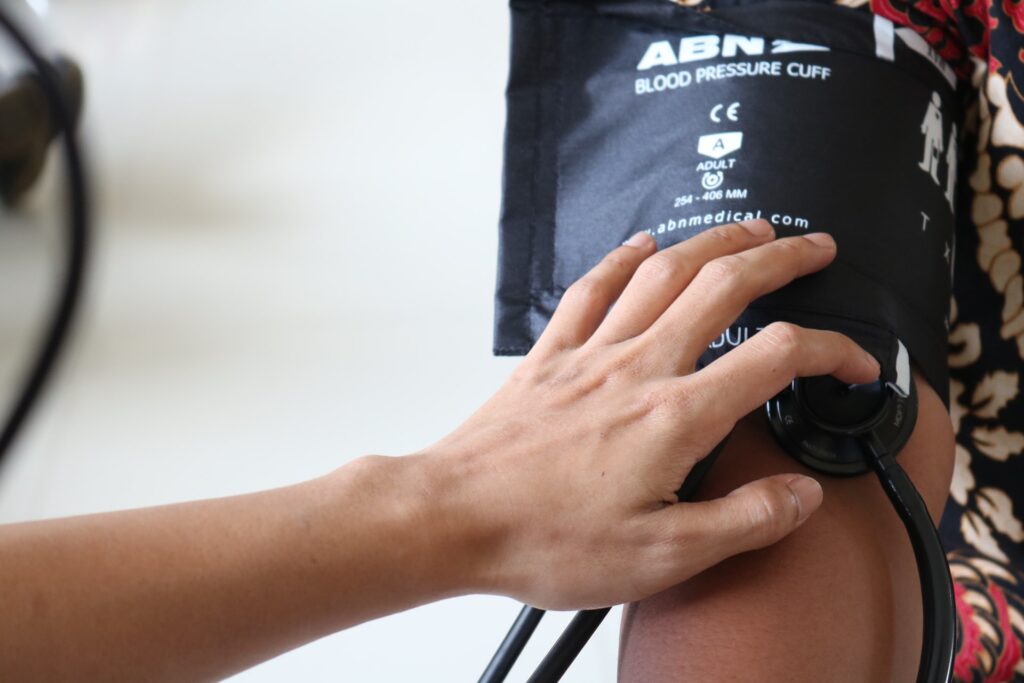Table of Contents
Hypertension
Hypertension also referred to as high blood pressure is a long-term medical condition where the blood pressure in the arteries is chronically elevated above acceptable standards. Chronically elevated blood pressure is a threat to health and sometimes even life as it raises the risk of mortality and is a major risk factor for stroke, coronary artery disease, heart failure, atrial fibrillation, peripheral arterial disease, vision loss, chronic kidney disease and dementia(1).
High blood pressure can be caused by many factors. Some of them include excessive sodium in the diet, lack of physical activity, obesity, smoking, stress, lack of sleep and alcohol(2).
Hypertension symptoms
Hypertension itself does not often cause noticeable symptoms that would bother one suffering from it during activities of daily life, however it can be a threat if left untreated for a prolonged period. It can be treated through medicine and lifestyle changes, such as reducing the intake of alcohol, and sodium, quitting smoking, losing weight, exercising or nutritional therapy based on a healthy diet(2). High blood pressure can be diagnosed only through a blood pressure check (preferably by a medical professional or other trained people) as it does not typically cause noticeable symptoms, thus it is important to check the blood pressure regularly before it’s too late.
Nutritional therapy and hypertension treament
Nutritional therapy is considered a lifestyle modification and lifestyle modifications are considered one of the most important tools for effective lowering of high blood pressure. The role of nutritional therapy in lowering high blood pressure is instructing the patient to consume certain foods, that have blood pressure normalising properties(3). While such foods are recommended and indicated for consumption, on the other side, certain foods are contraindicated and thus excluded from the diet as they might worsen the condition. The nutritional therapist aims to carefully recommend healthy foods to the patient, while at the same time they instruct the patient to exclude other, unhealthy foods, that have adverse health effects. Combination of such actions with other factors (e.g. other lifestyle modifications consisting of inducing physical exercise routine, anger management classes, meditation lessons, getting enough sleep or referring to a counsellor) can positively impact the patient’s health and reduce the blood pressure over time. As one of the research suggests(4), adopting a certain dietary approach can be effective in the prevention and management of high blood pressure. Such diets are more effective in the elderly and hypertensive patients, especially in the studies that provided healthy meals and/or regular nutritional consulting with a specialist. Such a specialist’s role is not only to provide advice on healthy eating but also to monitor the patient’s health, and nutritional habits, support them and ensure that the patient adheres to the guidelines.
Hypertension guidelines
When it comes to the general nutritional guidelines of such therapy, they aim to support general health through adhering to healthy eating patterns and general cues, that are typically adapted for most people as a form of prevention of hypertension. According to WebMD(5), examples of such nutritional guidelines are increasing omega-3 intake, reducing the excess sodium, reducing alcohol consumption, providing adequate intake of certain minerals (e,g, potassium and magnesium) and increasing the intake of fruit and vegetables as such guidelines have typically been found to prevent hypertension and help reduce high blood pressure in hypertensive patients.
References:
- Wikipedia, Hypertension, accessed on 13/05/21, available at: https://en.wikipedia.org/wiki/Hypertension
- NHS, High blood pressure (hypertension), accessed on 13/05/21, available at: https://www.nhs.uk/conditions/high-blood-pressure-hypertension/
- K Hermansen(2000), Diet, blood pressure and hypertension, available at: https://pubmed.ncbi.nlm.nih.gov/10889801/
- Cemal Ozemek et. al.(2018), The role of diet for prevention and management of hypertension, available at: https://pubmed.ncbi.nlm.nih.gov/29771736/
- WebMD, DASH Diet and High Blood Pressure, accessed on 13/05/21, available at: https://www.webmd.com/hypertension-high-blood-pressure/guide/dash-diet




